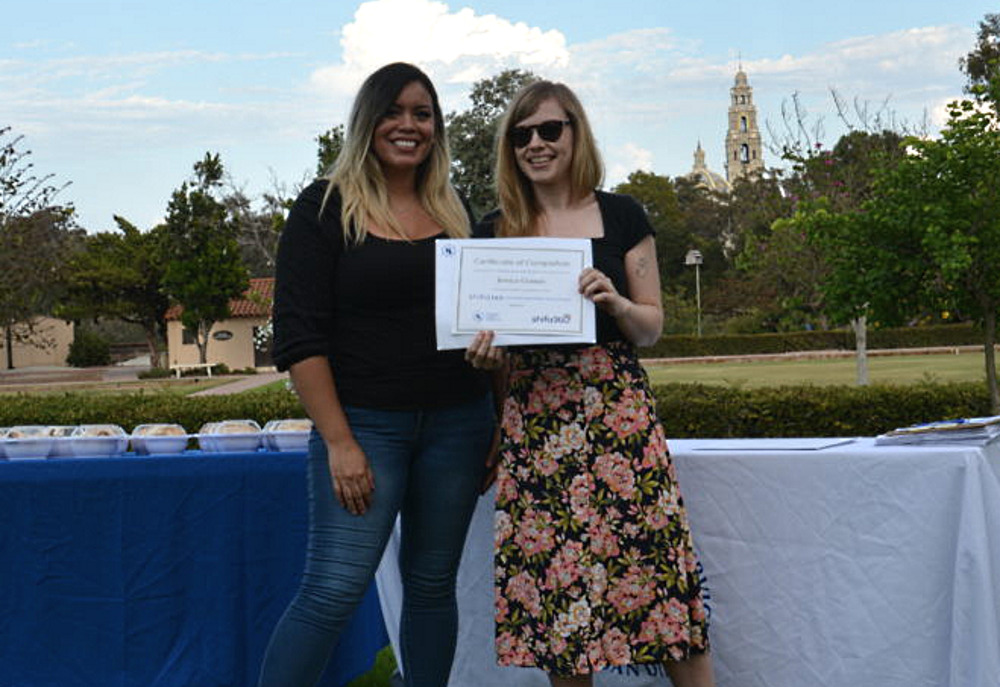Ilhan Omar, 23, a recent college graduate, aspiring social worker and daughter of Somali refugees, was concerned by how many people in her San Diego immigrant community seemed to have difficulty accessing appropriate medical care.
The cultural, linguistic, and socioeconomic barriers became especially glaring when the coronavirus pandemic struck.
So when Omar learned that Somali Family Service was launching a community health worker training program in July 2021 called SHIFA360—shifa means healing in Arabic— she was eager to get involved.
 The goal of SHIFA360 is to empower marginalized communities by training members as community health workers and developing culturally and linguistically appropriate health education. Anyone over the age of 18 was eligible to participate in the program, which combined online and on-site learning.
The goal of SHIFA360 is to empower marginalized communities by training members as community health workers and developing culturally and linguistically appropriate health education. Anyone over the age of 18 was eligible to participate in the program, which combined online and on-site learning.
In addition to joining as a trainee, Omar helped recruit other young people, including high school students, through her local mosque.
“Given that San Diego is the largest refugee resettlement site in California and one of the largest resettlement sites in the U.S, we wanted to ensure that health services were available for these communities to promote health equity,” Omar said. “This training gives students the opportunity to learn and grow, not only as future employees, but as a voice for the community.”
The four-week program focuses on several core competencies, including effective communication skills; HIPAA and privacy laws; business etiquette and acumen; cultural sensitivity; and the use of telehealth technology. Health experts from a range of backgrounds provide hands-on training and mentorship.
“Due to their existing competence in various languages and their own cultural backgrounds and lived experiences, there are no other candidates that are as good of a fit when it comes to serving the communities they represent,” Najla Ibrahim said.
In addition to shadowing community health workers, students also received help with their resumes and cover letters.
“We are eager to place our learners with employers who can benefit from their training in work with underserved communities, while also providing them with the necessary real world experience to help their careers in community health to grow,” said Samantha Streuli, co-instructor of the training program who is also a community health specialist and researcher.
This innovative approach provides immigrant and refugee community members, especially those who are between the ages of 18 to 25, a career path as well as the opportunity to help dismantle barriers to care within their communities, said Ahmed Sahid, President and CEO of Somali Family Service.
“Ultimately, we are trying to reduce inequities, and the youth are our future, thus we need to invest in them,” he said. “The SHIFA360 program is a way to empower the youth in the process.”
He said community health workers can take on a number of roles, including peer support counselors, health educators, care coordinators, family advocates, systems navigators, intake coordinators, and outreach workers.
While SHIFA360 was in place to run before the pandemic, it came to fruition during a time when employment and healthcare opportunities were sorely needed, said Najla Ibrahim, the director of health and wellness at Somali Family Service. Many people in the community had lost their jobs due to the pandemic and were looking for opportunities to rejoin the workforce.
“This rapid four-week training program will help upskill them and get them the training and background they need to secure a community health worker position,” said Ibrahim. “Due to their existing competence in various languages and their own cultural backgrounds and lived experiences, there are no other candidates that are as good of a fit when it comes to serving the communities they represent.”
While the program has been popular with young people, it enrolled 60 students between the ages of 22 to 62. So far, 21 have graduated, and Somali Family Service is in the process of matching them with jobs.
As for Omar, she feels that the SHIFA360 program is valuable because it is a stepping stone for her community.
“My passion and goals are to obtain an enriched and enhanced knowledge of public services with intentions of becoming a social work professional and advocate for vulnerable communities,” Omar said.
Correction: This article has been updated to reflect the accurate name of the organization Somali Family Service. It was previously identified as Somali Family Services.






























